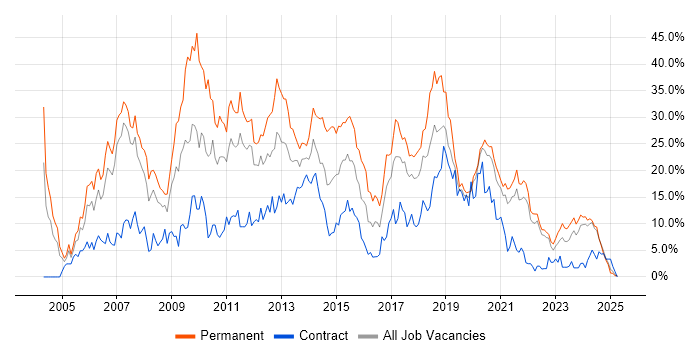Microsoft .NET (dotNet)
North East > Durham
The table below provides summary statistics and salary benchmarking for jobs advertised in Durham requiring .NET skills. It covers permanent job vacancies from the 6 months leading up to 7 January 2026, with comparisons to the same periods in the previous two years.
| 6 months to 7 Jan 2026 |
Same period 2025 | Same period 2024 | |
|---|---|---|---|
| Rank | 21 | 29 | 12 |
| Rank change year-on-year | +8 | -17 | +12 |
| Permanent jobs citing .NET | 11 | 8 | 16 |
| As % of all permanent jobs in Durham | 5.05% | 3.96% | 10.46% |
| As % of the Libraries, Frameworks & Software Standards category | 55.00% | 20.00% | 59.26% |
| Number of salaries quoted | 11 | 4 | 15 |
| 10th Percentile | - | - | £38,000 |
| 25th Percentile | £32,500 | £48,750 | £43,125 |
| Median annual salary (50th Percentile) | £43,250 | £53,750 | £50,000 |
| Median % change year-on-year | -19.53% | +7.50% | +21.95% |
| 75th Percentile | £73,875 | £60,625 | £60,000 |
| 90th Percentile | £77,500 | £66,250 | £67,000 |
| North East median annual salary | £68,500 | £65,000 | £50,000 |
| % change year-on-year | +5.38% | +30.00% | +5.26% |
All Software Libraries and Frameworks
Durham
.NET falls under the Software Libraries and Frameworks category. For comparison with the information above, the following table provides summary statistics for all permanent job vacancies requiring technical specification, industry standards, software libraries and framework skills in Durham.
| Permanent vacancies with a requirement for technical specification, industry standards, software libraries and framework skills | 20 | 40 | 27 |
| As % of all permanent jobs advertised in Durham | 9.17% | 19.80% | 17.65% |
| Number of salaries quoted | 17 | 26 | 26 |
| 10th Percentile | £32,500 | £40,000 | £36,875 |
| 25th Percentile | £39,625 | £46,910 | £38,813 |
| Median annual salary (50th Percentile) | £68,500 | £53,875 | £50,000 |
| Median % change year-on-year | +27.15% | +7.75% | +14.29% |
| 75th Percentile | £77,500 | £74,144 | £61,875 |
| 90th Percentile | £78,790 | £79,800 | £69,800 |
| North East median annual salary | £50,000 | £59,430 | £55,000 |
| % change year-on-year | -15.87% | +8.05% | - |
.NET
Job Vacancy Trend in Durham
Historical trend showing the proportion of permanent IT job postings citing .NET relative to all permanent IT jobs advertised in Durham.

.NET
Salary Trend in Durham
Salary distribution trend for jobs in Durham citing .NET.

.NET
Salary Histogram in Durham
Salary distribution for jobs citing .NET in Durham over the 6 months to 7 January 2026.
.NET
Job Locations in Durham
The table below looks at the demand and provides a guide to the median salaries quoted in IT jobs citing .NET within the Durham region over the 6 months to 7 January 2026. The 'Rank Change' column provides an indication of the change in demand within each location based on the same 6 month period last year.
| Location | Rank Change on Same Period Last Year |
Matching Permanent IT Job Ads |
Median Salary Past 6 Months |
Median Salary % Change on Same Period Last Year |
Live Jobs |
|---|---|---|---|---|---|
| Peterlee | 0 | 2 | £49,625 | -5.48% | |
| .NET North East |
|||||
.NET
Co-Occurring Skills & Capabilities in Durham by Category
The following tables expand on the one above by listing co-occurrences grouped by category. They cover the same employment type, locality and period, with up to 20 co-occurrences shown in each category:
